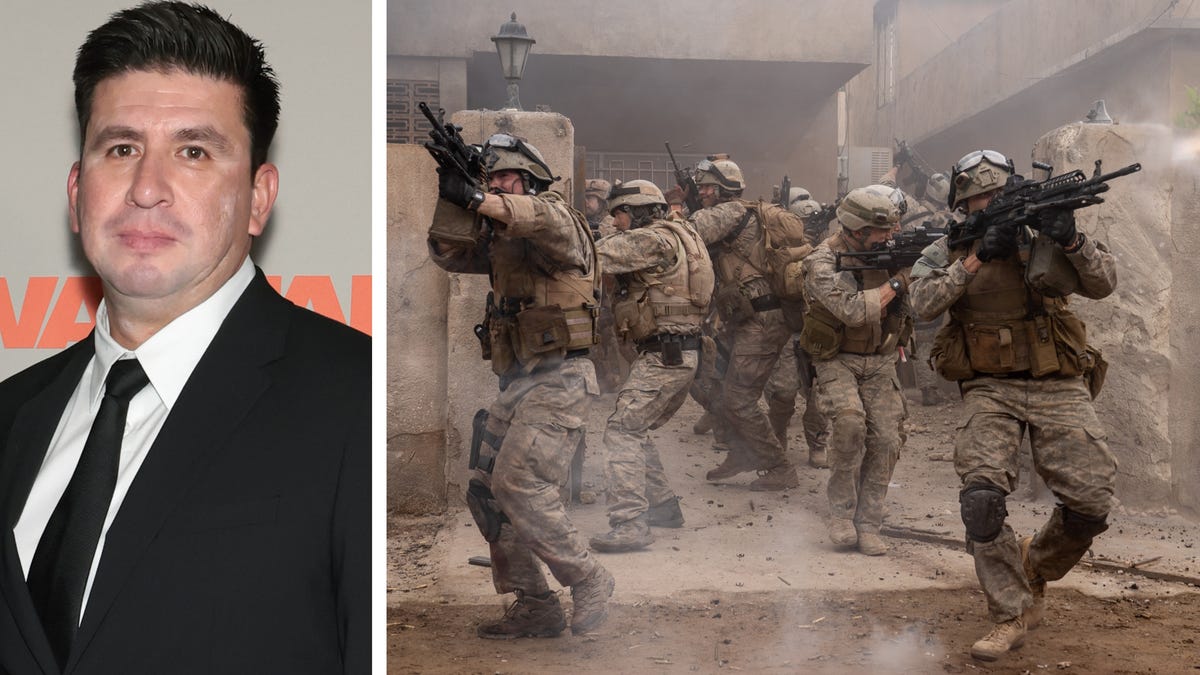‘Warfare’: Alex Garland re-creates Iraqi town for battle scenes
Co-writer/co-director Alex Garland explains how he re-created an Iraqi neighborhood to film battle scenes for the military drama “Warfare.”
Spoiler alert! We’re discussing major plot details about the new movie “Warfare.”
Ray Mendoza knew he needed to make “Warfare.”
The pulse-pounding Iraq War drama (in theaters Friday) is co-directed by the retired Navy SEAL, who dedicated the film to his platoonmate, Elliott Miller. Miller suffered a traumatic brain injury during a mission gone wrong in 2006, and Mendoza aimed to help jog his memory by re-creating their heroic survival story.
Already, “Warfare” has struck a chord with veterans. At a recent screening, Mendoza met the wife of a former Marine, who had struggled to communicate his experiences with PTSD.
“She came up to me crying and thanked me,” the first-time filmmaker recalls. “She finally understood what her husband was trying to tell her.” After watching the movie, “he started sharing his experiences with her, which he hadn’t up to that point. That was a pretty powerful moment for me.”
Navy SEAL veteran recalls ‘the most emotional moment’ making ‘Warfare’
“Warfare” is a harrowing, hyperrealist look at a platoon of Navy SEALs, tracking them for 90 real-time minutes as they try to save their gravely wounded comrades, Elliott (Cosmo Jarvis) and Sam (Joseph Quinn), after an armed ambush and explosion. The film is pieced together from the memories of the real SEAL team, whom Mendoza interviewed as he co-wrote the script with Alex Garland (“Annihilation”).
“It’s a really honest portrayal,” says Mendoza, who sought to capture the split-second mistakes and decisions that soldiers are faced with during combat. “I wanted to show that as bad as this looks, it took a whole lot of effort and training to get us home. Everyone made it back alive on our side. That was a deep hole to climb out of, but we did it together.”
One might imagine that reconstructing a bloody, frenzied firefight could be retraumatizing for Mendoza. But the experience was actually “very liberating,” he says. “It was like this weight coming off.” His chief concern was to portray his friends accurately, and to not get too hung up on D’Pharaoh Woon-A-Tai (“Reservation Dogs”), who plays him in the film.
“It’d be unfair for me to say, ‘I need you to be exactly the way I am and move the way I do,’ ” Mendoza says. “It was all about capturing the essence. I just had to treat him like a character.”
There was one scene, though, that Mendoza found especially difficult, as Ray drags an unconscious, badly maimed Elliott inside after an IED attack.
“I’ve had so many dreams about that (event) where Elliott is walking and talking and laughing after the explosion,” Mendoza says. “But when I wake up, it’s a freaking nightmare because my friend’s not walking anymore. Elliott was with me when we shot that scene – with all the smoke and sounds – and he started to get upset. I was holding it in for a while because the cast was around me, but then I walked off set and cried for a very long time. That was probably the most emotional moment for me on the movie.”
First-time director Ray Mendoza got into filmmaking as a recruiting effort
Mendoza joined the Navy in 1997 and served for 16 years. He always loved Michael Mann movies growing up, but never had filmmaking ambitions of his own. That changed with 2012’s “Act of Valor,” a thriller featuring real Navy SEALs including Mendoza.
At the time, “we had just had two major catastrophes with helo crashes where we lost a bunch of SEALs and nobody was signing up,” Mendoza says. “The Navy felt doing a film was a good recruiting tool. That was where I got the itch.”
He went on to work as a technical and military adviser on combat films such as “Lone Survivor,” “The Outpost” and “Civil War,” where he met Garland.
“It’s been 15 years of learning and acquiring all the tools to do this movie,” Mendoza says. “I asked a lot of the directors I worked with whether I should go to film school. They were like, ‘You already are in film school. You’re not going to learn anything there that you can’t here.’ ”
Mendoza is eager to take on more projects. He started a production company, War Office Productions, with former Army Ranger Jariko Denman, which endeavors to tell more military stories at home and on the battlefield.
If there’s one Hollywood cliché he hopes to get rid of, it’s the weepy veteran drama: “You read the script, and there’s the apartment with the pill bottles open and the empty whiskey bottle,” Mendoza says. “That’s often associated with us and I don’t like it. It’s a misrepresentation.”
He would also like to move into other genres such as sci-fi or comedy.
“I feel like I’m a pretty funny person, although some people might disagree,” Mendoza jokes. “There’s something about experiencing combat, where there’s the worst and best of humanity. I’ve seen the whole spectrum, and I think that makes me relatable with a lot of people who have experienced different types of trauma. I know what it feels like to not want to leave your house; to sit in a dark room or not eat for days.
“I connect with a lot of characters in other types of genre movies, probably more than most directors, to be honest. So I would love to do that someday.”

Leave a Reply